Qubic claims to control over half of the hash power, while experts confirm the success of the attack.
Led by former IOTA co-founder Sergey Ivancheglo, the AI protocol Qubic announced that it has successfully controlled over 51% of the hash power of the Monero network. If this statement is true, it would give the project the ability to reorganize blocks, censor transactions, and execute double spending attacks.
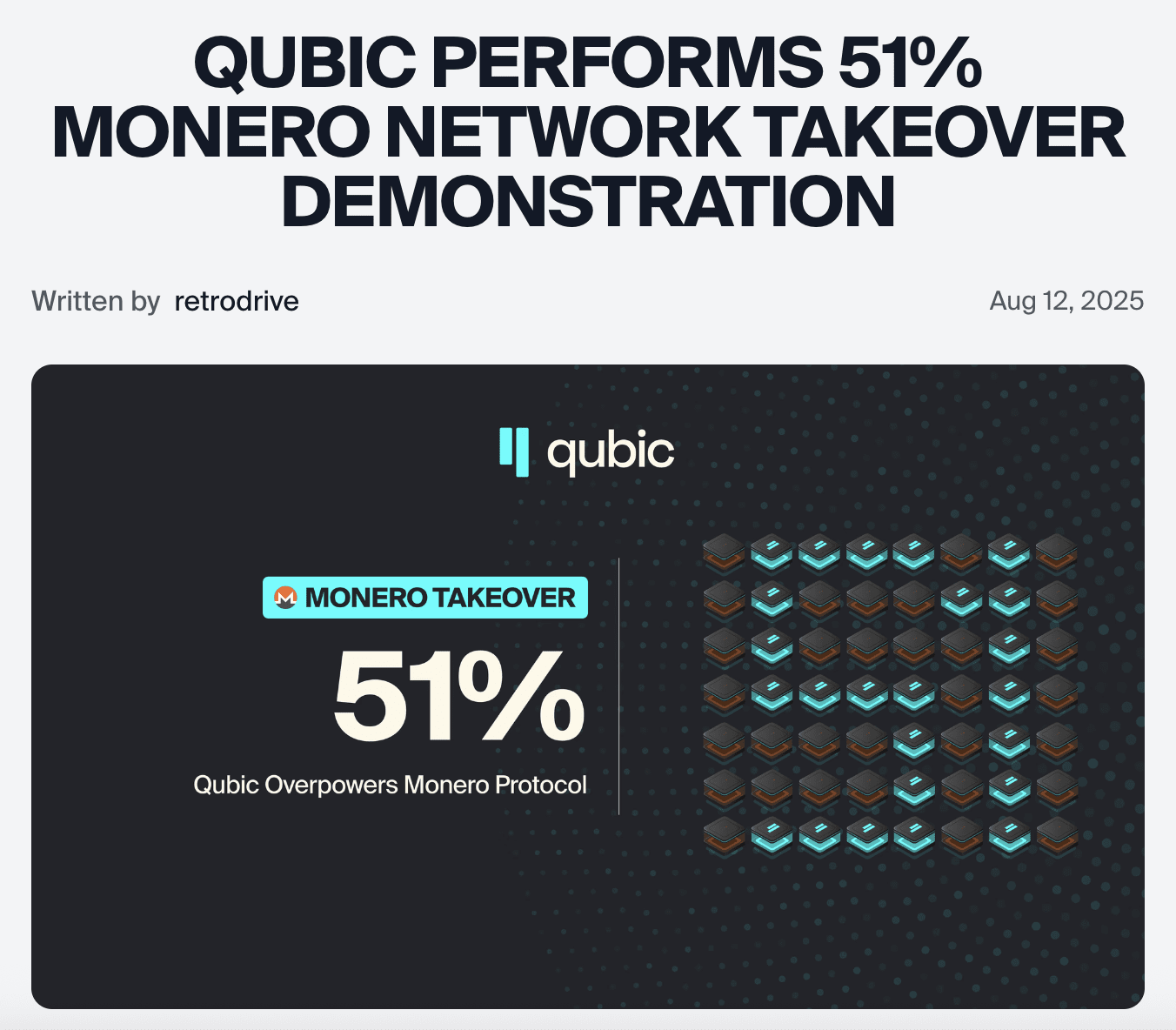 Source: Qubic Qubic claims to have successfully controlled over 51% of the hash power of the Monero network.
Source: Qubic Qubic claims to have successfully controlled over 51% of the hash power of the Monero network.
Ledger CTO Charles Guillemet confirmed the success of this attack, stating that Monero is undergoing a 'successful 51% attack' and observed significant chain reorganization phenomena.
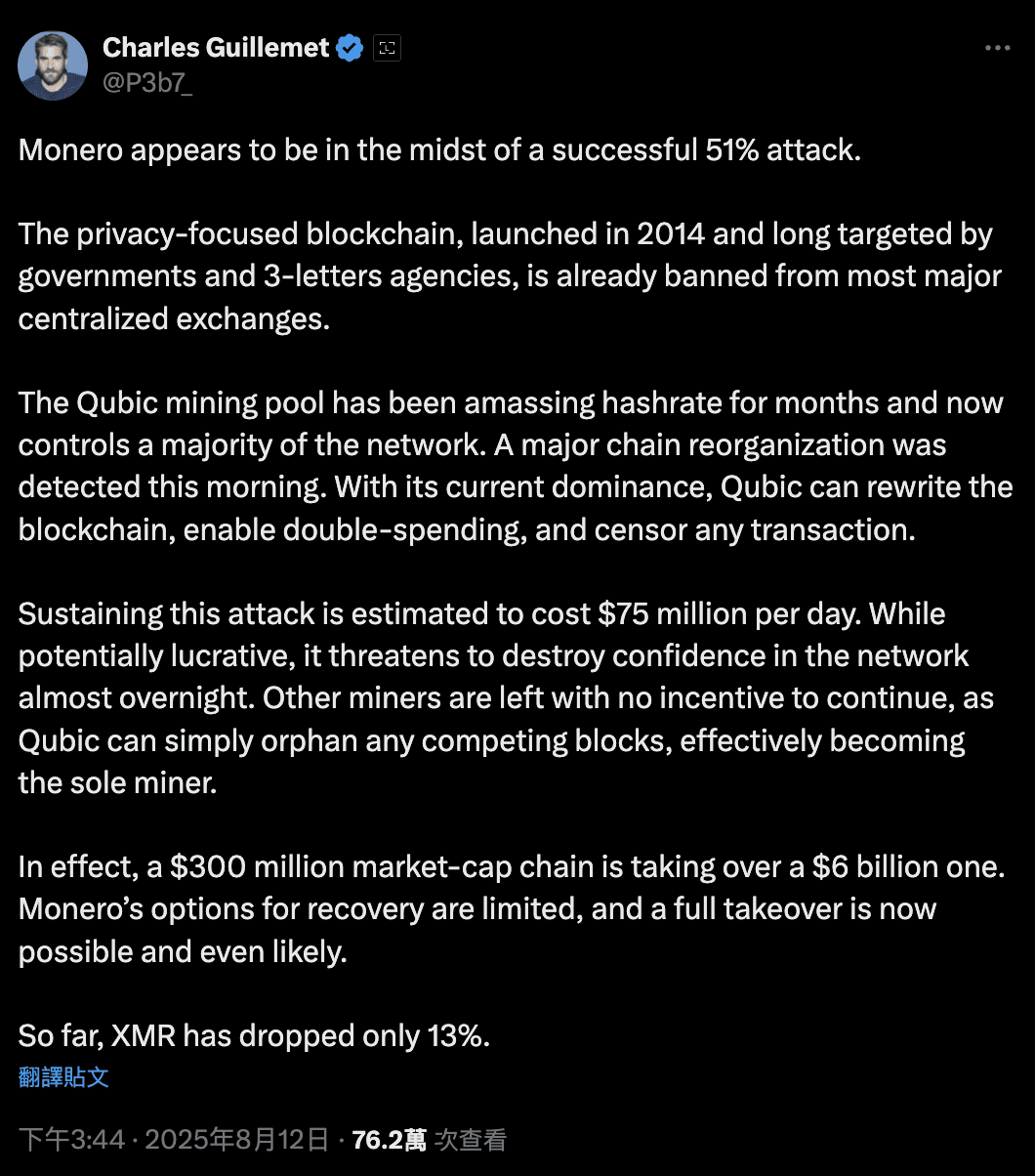 Source: X/@P3b7_ Ledger CTO Charles Guillemet pointed out that Monero is undergoing a 'successful 51% attack' and observed significant chain reorganization phenomena.
Source: X/@P3b7_ Ledger CTO Charles Guillemet pointed out that Monero is undergoing a 'successful 51% attack' and observed significant chain reorganization phenomena.
The founder of blockchain security company SlowMist, Yu Xian, also confirmed the success of the attack, stating: "I have been following this, and it seems that the 51% attack on Monero has been successful." He noted that theoretically, the Qubic mining pool can now rewrite the blockchain, achieve double spending, and censor any transactions.
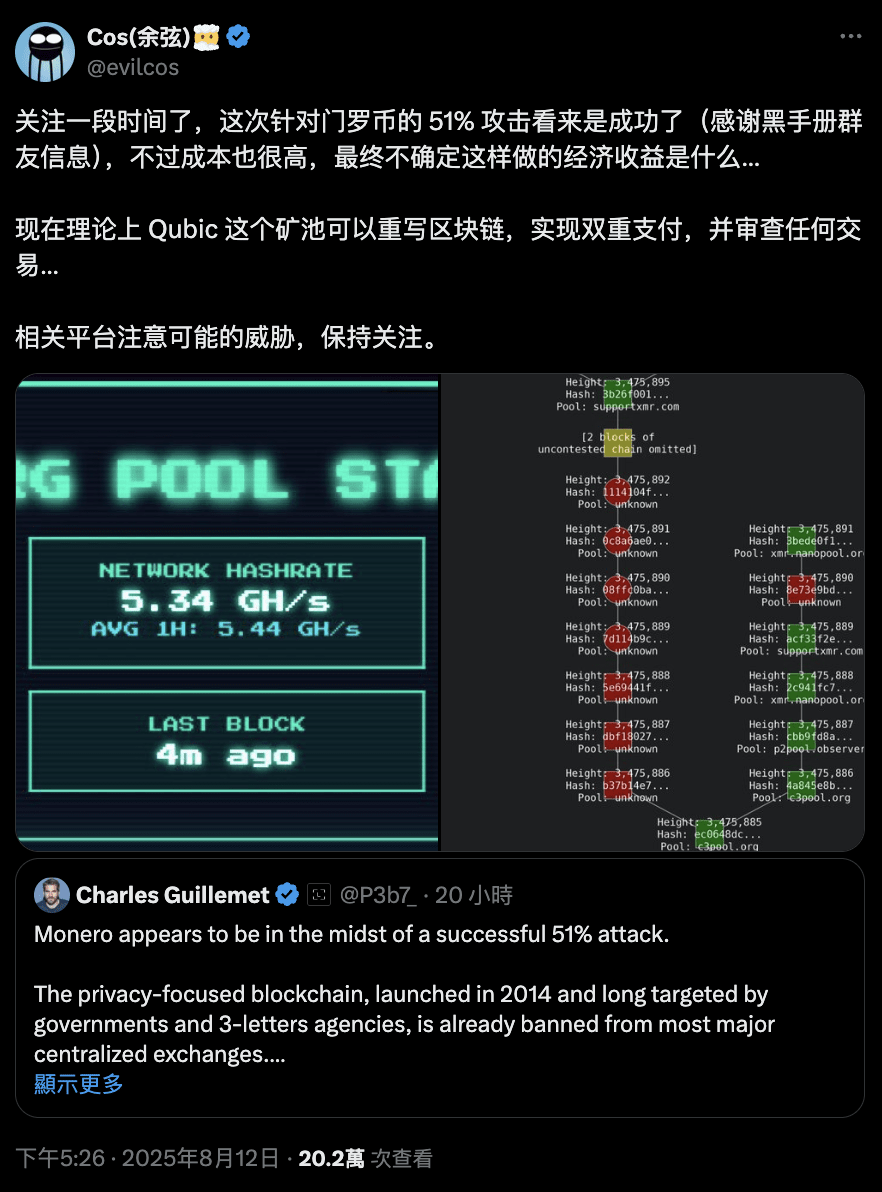 Source: X/@evilcos SlowMist founder Yu Xian also confirmed the success of the attack.
Source: X/@evilcos SlowMist founder Yu Xian also confirmed the success of the attack.
Qubic began implementing this strategy in mid-May, with its share of the Monero network soaring from less than 2% to over 25%, ultimately claiming to have surpassed the 51% threshold. The project uses a 'useful proof of work' (uPoW) model to attract miners by offering rewards nearly three times higher than traditional Monero mining pools, with data showing daily profits of $3.13, far exceeding the standard pool's $0.64.
The attack is costly but poses a significant threat, with a stark market cap disparity.
Guillemet estimates that maintaining this attack costs about $75 million daily, but he warns that such control could yield profits in the short term while nearly overnight destroying network confidence. He pointed out: "Other miners lose the motivation to continue, as Qubic can simply isolate any competing blocks, effectively becoming the sole miner."
This incident highlights the power asymmetry in the cryptocurrency market. Guillemet emphasized: 'In reality, a chain with a market capitalization of $300 million is taking over a chain worth $6 billion.' Qubic's strategy revolves around incentive-driven 'paid conversion' mining activities, attracting participants by offering significantly higher rewards than conventional Monero mining pools.
According to data from Chaos Labs, as miners chase higher returns, Monero's hash rate has climbed to 3.01 GH/s. Qubic's model involves distributing half of the mining profits to participating miners, while the other half is used to purchase and destroy $QUBIC tokens. If the project mines 100% of the daily blocks of Monero, it will produce about 432 Monero ($XMR), valued at approximately $118,000 at current prices.
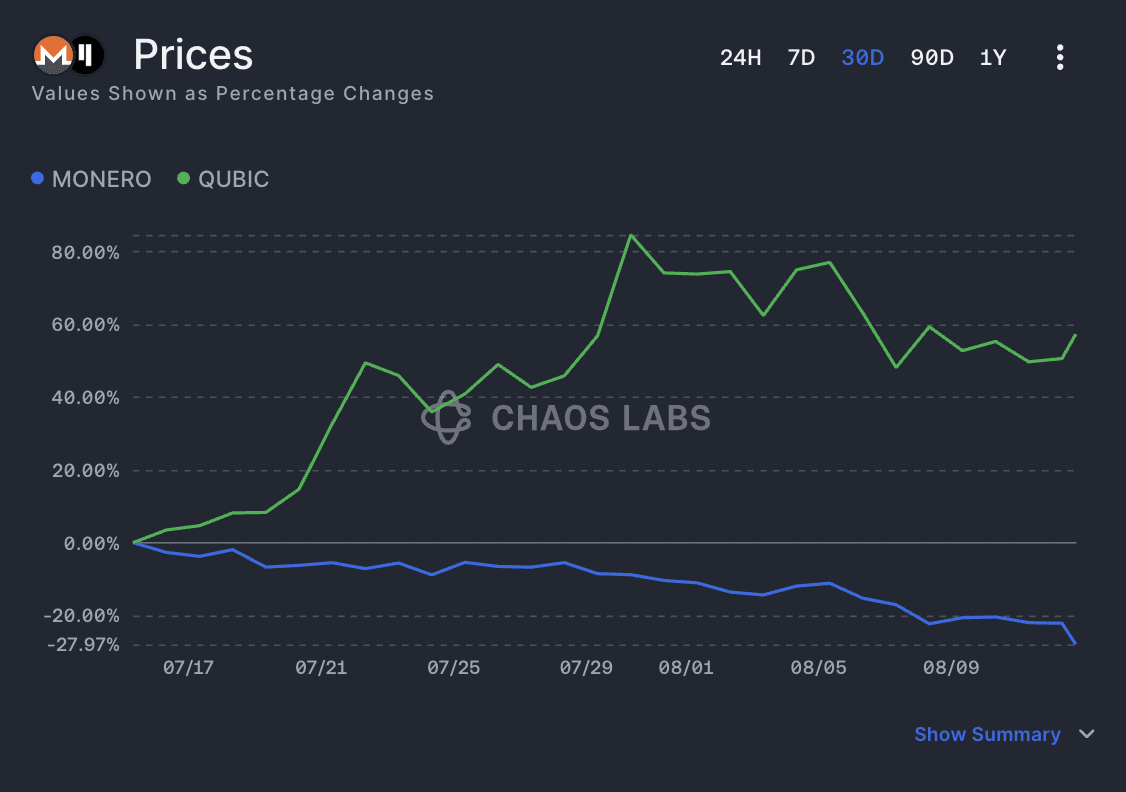 Source: Chaos Labs The impact of the Qubic attack on the price of Monero ($XMR).
Source: Chaos Labs The impact of the Qubic attack on the price of Monero ($XMR).
Privacy coins face a survival crisis, with $XMR plummeting nearly 25%.
This attack has dealt a devastating blow to privacy-focused Monero. The price of $XMR has dropped over 8% in the past 24 hours, falling to $247.85, with a total decline of 25% over the past week, making it the third worst-performing token among the top 100 cryptocurrencies. In contrast, other privacy coins like Zcash and Dash have maintained relatively stable performance.
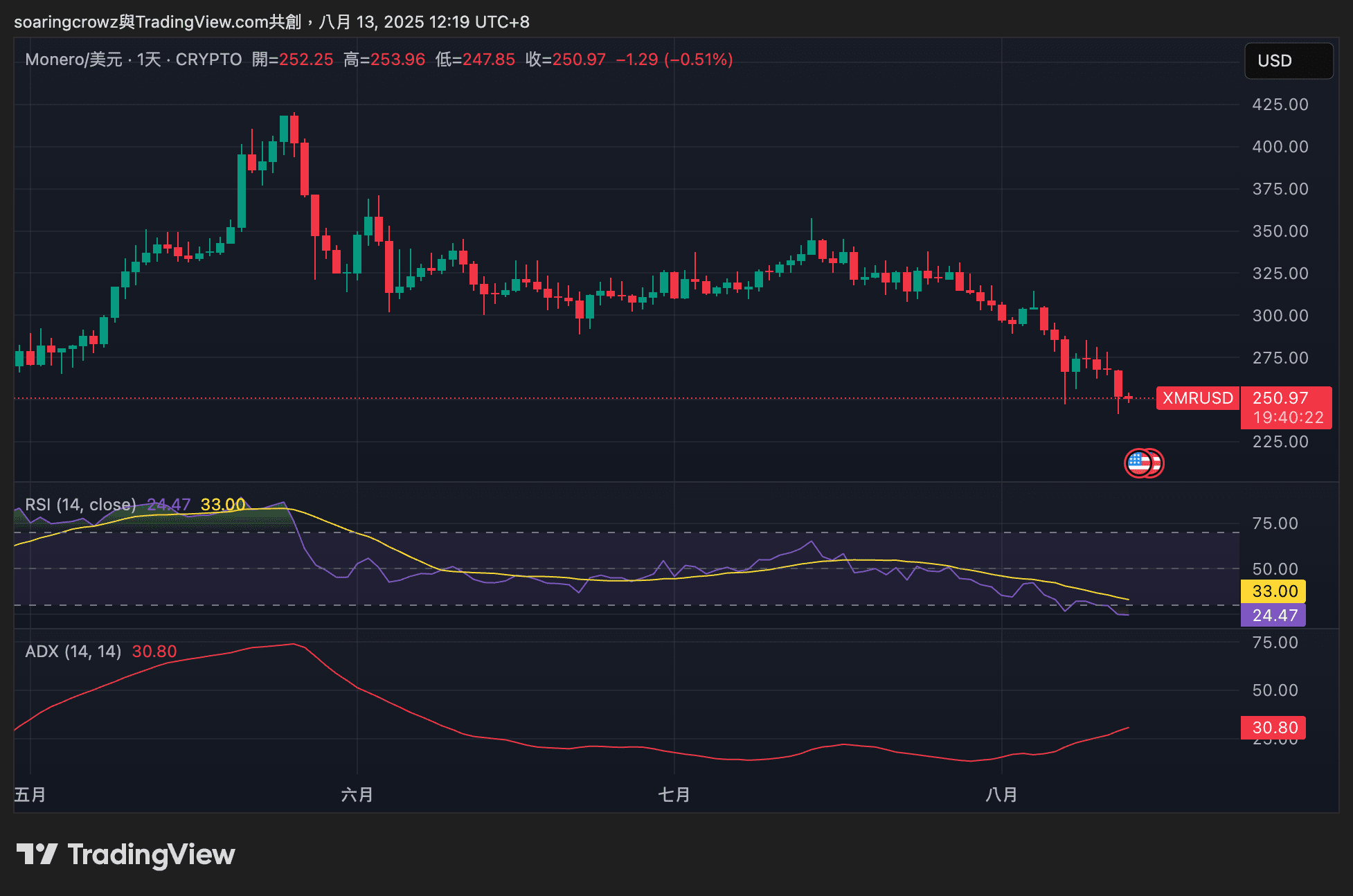 Source: TradingView The price of $XMR has dropped over 8% in the past 24 hours.
Source: TradingView The price of $XMR has dropped over 8% in the past 24 hours.
Technical analysis shows that $XMR has broken through several key support levels, with the Relative Strength Index (RSI) dropping to 24.47 points, indicating a severely oversold condition. The Average Directional Index (ADX) reached 30.8 points, confirming that the strong downtrend is still ongoing. Trading volume has surged significantly, showing that investors are eager to exit.
Monero uses the RandomX algorithm to resist ASIC centralization and encourage CPU mining to maintain network decentralization. However, Qubic's 'useful proof of work' system successfully bypassed these protections, achieving network control through economic incentives rather than technical means.
Motives for the attack are in doubt, future prospects are concerning.
Ivancheglo claims that this attack is intended to help the Monero community prepare for future network threats, particularly potential attacks from government agencies.
He stated on social media: 'The Monero team is refining the details of its 51% attack protection. Many have accused us of being sponsored by three-letter agencies to attack this anonymous coin. What do you think now that we are helping Monero prepare for future battles against these agencies?'
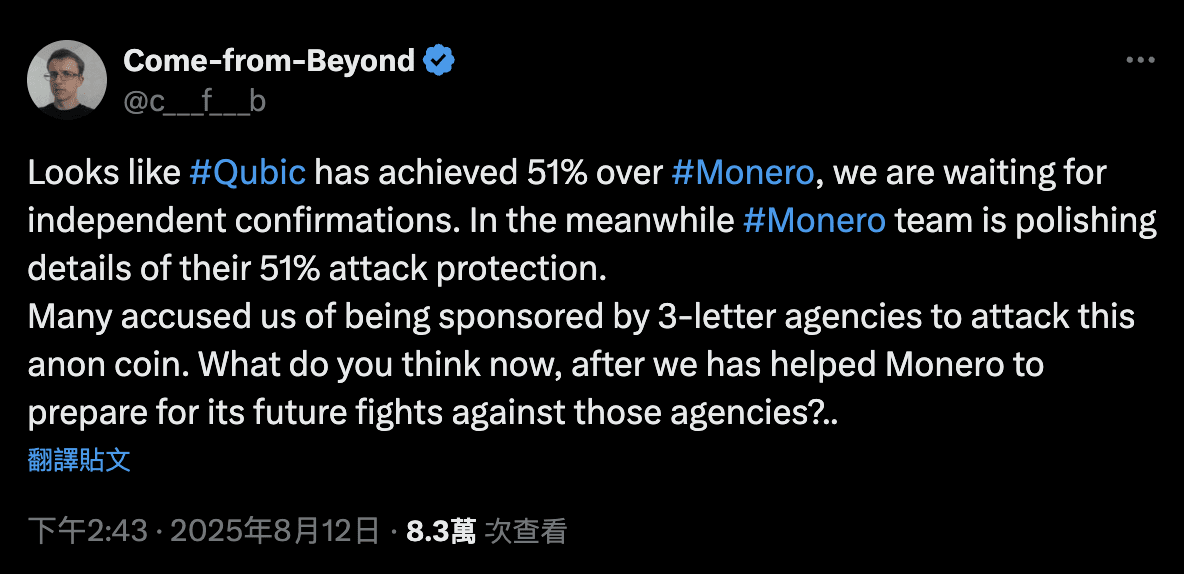 Source: X/@c___f___b Sergey Ivancheglo stated that Qubic is helping the Monero community prepare for future network threats.
Source: X/@c___f___b Sergey Ivancheglo stated that Qubic is helping the Monero community prepare for future network threats.
However, some experts have expressed skepticism about the authenticity of the attack. Luke Parker, chief developer of SeraiDEX, believes that a network reorganization six blocks deep does not prove the success of a 51% attack, and may simply indicate that 'an opponent with a lot of hash power got lucky.' He questions Qubic's claims of majority hash power, pointing out that since the project has excluded its data from public analysis, it is difficult to verify the relevant numbers.
Guillemet warned that Monero's recovery options are limited, and a complete takeover by Qubic is now not only possible but even likely. This incident threatens the integrity of the network and raises questions about its future viability. As a privacy coin already banned on most major centralized exchanges, Monero's liquidity is already constrained, and this attack has exacerbated the situation.
'Monero drops 25% this week! Qubic mining pool claims to have conducted a 51% attack, experts warn: possible total collapse.' This article was first published on 'Crypto City.'

